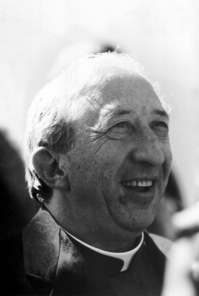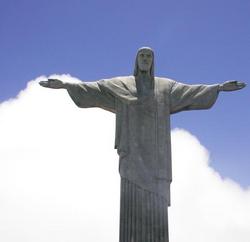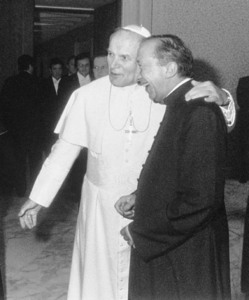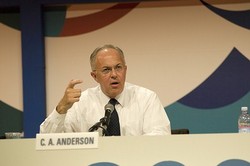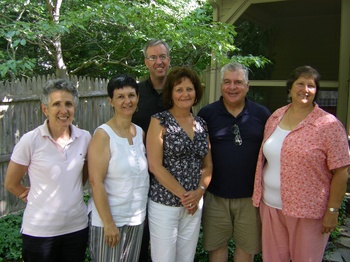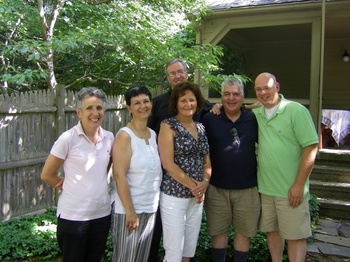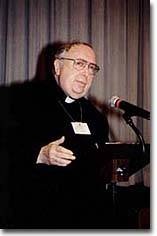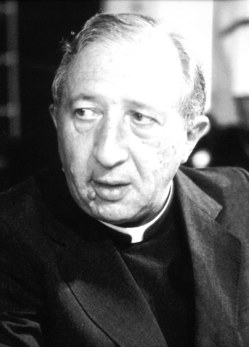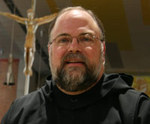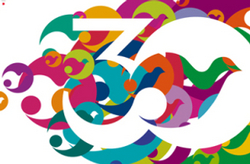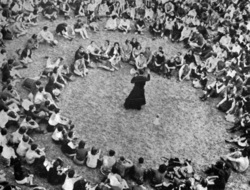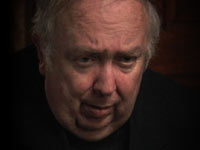On the Thirtieth Anniversary of the Founding of Communion and
Liberation
Rome, September 29, 1984
Dearest Brothers and Sisters! I wish first
of all to thank Msgr Giussani for his introductory remarks, as well as all the
others who took part in this introduction.
1. I express my great joy for this
meeting with you, who have come here to Rome to celebrate thirty years of your
movement and to reflect together with the Pope on your history as persons who
live in the Church and are called to cooperate in intense communion, to bring
it to mankind, and to spread it in the world.
Looking at your faces, so open,
so happy on this festive occasion, I experience a deep feeling of joy and the
desire to show you my affection for your decision of faith and to help you to
be ever more mature in Christ, sharing His redemptive love for man. The
photographic exhibition which I was able to admire as I entered the room, words
(testimonies, accounts, and songs) that I have just heard have allowed me to
retrace, as from within, this period of your life, which is part of the life of
the Italian Church (and not only Italian any longer) of our time. These words
have given me the possibility of seeing clearly the educational criteria of
your way of living in the Church, which imply a vivacious and intense work in the
most varied social contexts.
I am grateful to the Lord for all this, who once
again has made me admire His mystery in you, which you bear and must always be
ready to bear, with humble awareness of being pliable clay in His creative
hands.
Continue with commitment on this road so that also through you the
Church may still more be the environment of the redemptive existence of man, a
fascinating environment where every man finds the answer to the question of the
meaning of his life: Christ, center of the cosmos and of history.
2. Jesus, the
Christ, He in whom everything is made and subsists, is therefore the
interpretative principle of man and his history. To affirm humbly but equally
tenaciously that Christ is the beginning and inspirational motive for living
and working of consciousness and of action, means to adhere to Him, to make
present adequately His victory over the world.
To work so that the content of
the faith becomes understanding and pedagogy of life is the daily task of the
believer, which must be carried out in every situation and environment in which
they are called to live. And the richness of your participation in ecclesial
life lies in this: a method of education in the faith so that it may influence
the life of man and history; in the sacraments, so that they bring about an
encounter with the Lord, and in Him with the brethren; in prayer, so that it be
an invocation and praise of God in authority, so that it be a guard and
guarantor of the authenticity of the ecclesial path.
The Christian experience
so understood and lived generates a presence which places the Church in every
human situation as the place where the event of Christ, “a stumbling-block
to the Jews… foolishness for the pagans” (1 Cor l; 23-24), lives as a
horizon full of truth for man.
3. We believe in Christ, dead and risen, in
Christ present here and now, who alone can change and changes man and the
world, by transfiguring them.
Your presence, ever more numerous and significant
in the life of the Church in Italy and in various nations in which your
experience is beginning to spread, is due to this certainty which you must
deepen and communicate, because it is this certainty that moves mankind. It is
significant in this regard, and it should be noted, how the Spirit, in order to
continue with the man of today that dialogue begun by God in Christ and
continued in the course of all Christian history, has raised up many ecclesial
movements in the contemporary Church. They are a sign of the freedom of forrns
in which the one Church is expressed, and they represent a secure newness,
which still awaits being adequately understood in all its positive efficacy for
the Kingdom of God at work in the present moment of history.
My venerated
predecessor, Pope Paul VI, addressing the members of the Florentine community
of Communion and Liberation on December 28, 1977, stated: “We thank you
also for the courageous, faithful, and firm witness that you have given in this
somewhat disturbed period because of certain misunderstandings you have had to
face. Be happy, be faithful, be strong and joyful and carry with you the
witness that the Christian life is beautiful, strong, serene, and really
capable of transforming the society in which it is lived.”
4. Christ is
the presence of God with man, Christ is the mercy of God towards sinners. The
Church, the Mystical Body of Christ, and the new People of God, brings to the
world this tender benevolence of the Lord, encountering and supporting man in
every situation, in every environment, on every occasion.
In so doing, the
Church contributes to generating that culture of truth and love which is able
to reconcile the person with himself and with his own destiny. In such a way
the Church becomes the sign of salvation for man, whose every desire for
freedom she welcomes and values. The experience of this mercy renders us able
to accept those who are different from us, to create new relationships, and to
experience the Church in all the wealth and depth of its mystery as an
unlimited desire for dialogue with man wherever he is found.
“Go into all
the world” (Mt 28;19) is what Christ said to his disciples. And I repeat
to you: “Go into all the world and bring the truth, the beauty, and the
peace which are found in Christ the Redeemer”. This invitation that Christ
made to all his followers and which Peter has the duty ceaselessly to renew, is
already interwoven with your history. In these thirty years you have been open
to the most varied situations, casting the seed of the presence of your
movement. I know that you have put down roots in eighteen nations in the world:
in Europe, in Africa, in America, and I know also the insistency with which
your presence is sought in other countries. Take on the burden of this
ecclesial need: this is the charge I leave with you today.
5. I know that you
well understand the indispensable importance of a true and full communion
between the various components of the ecclesial community. I am certain,
therefore, that you will not fail to commit yourselves with renewed fervor in
the search for more appropriate ways to carry out your activities in harmony
and collaboration with the bishops, the pastors, and with all the other
ecclesial movements.
Bring into the whole world the simple and transparent sign
of the event of the Church. Authentic evangelization understands and responds
to the needs of the individual man because it helps him to find Christ in the
Christian community. The man of today has a particular need to have Christ in
front of him, with clarity and evidence, as a profound sign of his birth, life,
and death, and of his suffering and joy.
May Our Lady, Mother of God and of the
Church, guide you constantly on the pathway of life. Knowing your devotion to
the Holy Virgin, I hope that she will be for all of you the “Morning
Star,” who will enlighten and strengthen your generous commitment of
Christian witness in the contemporary world.
And now I cordially give you my
Apostolic Blessing.
Pope John Paul II
